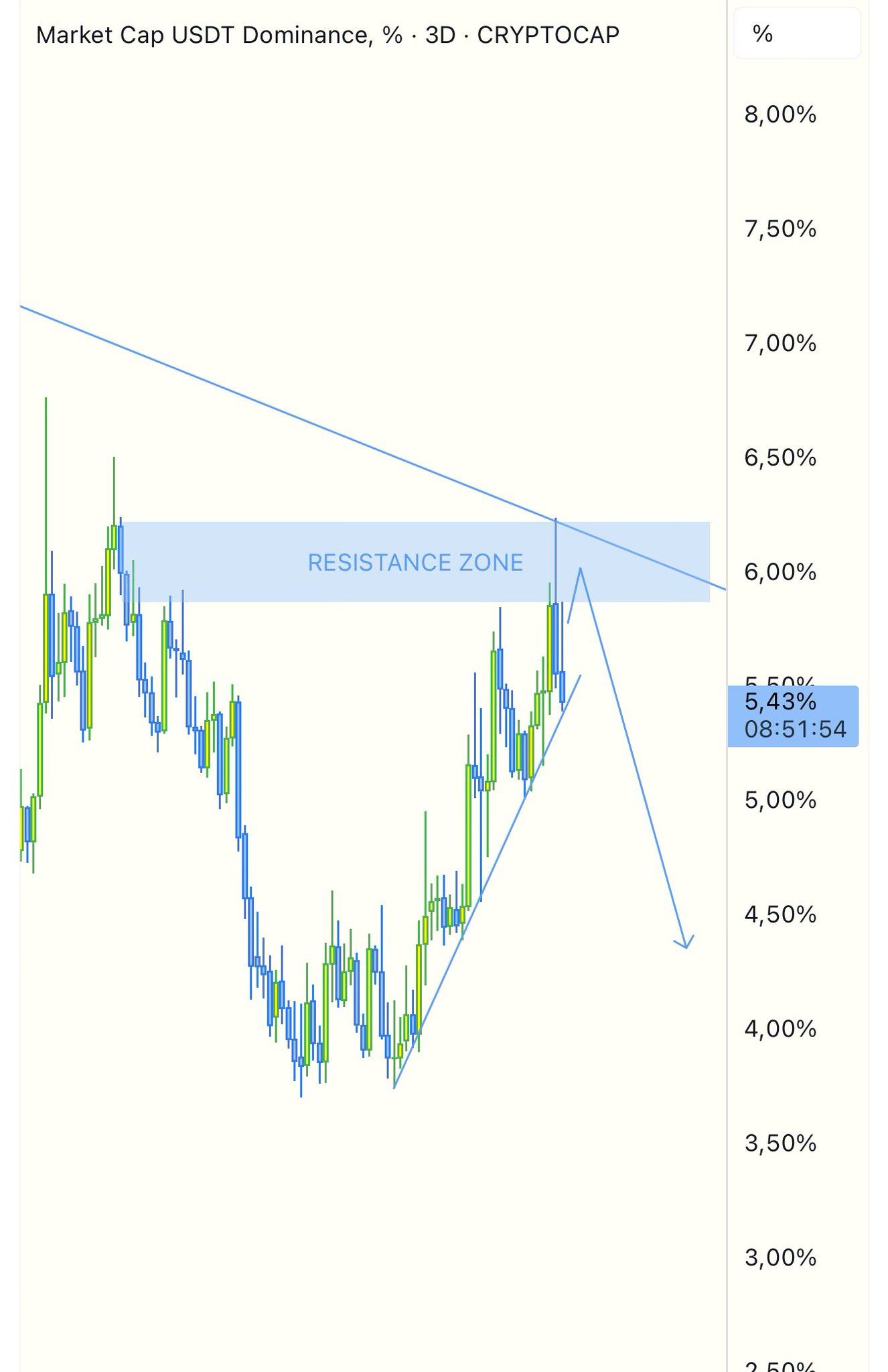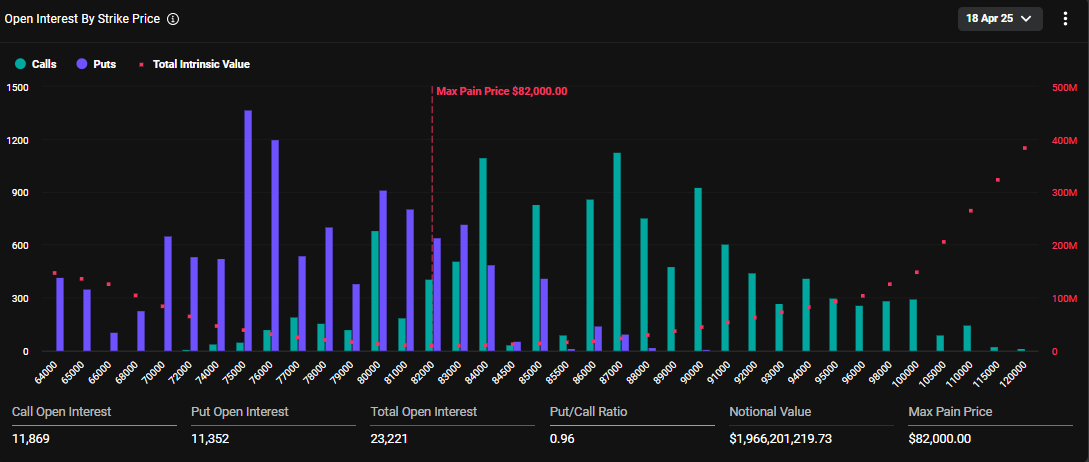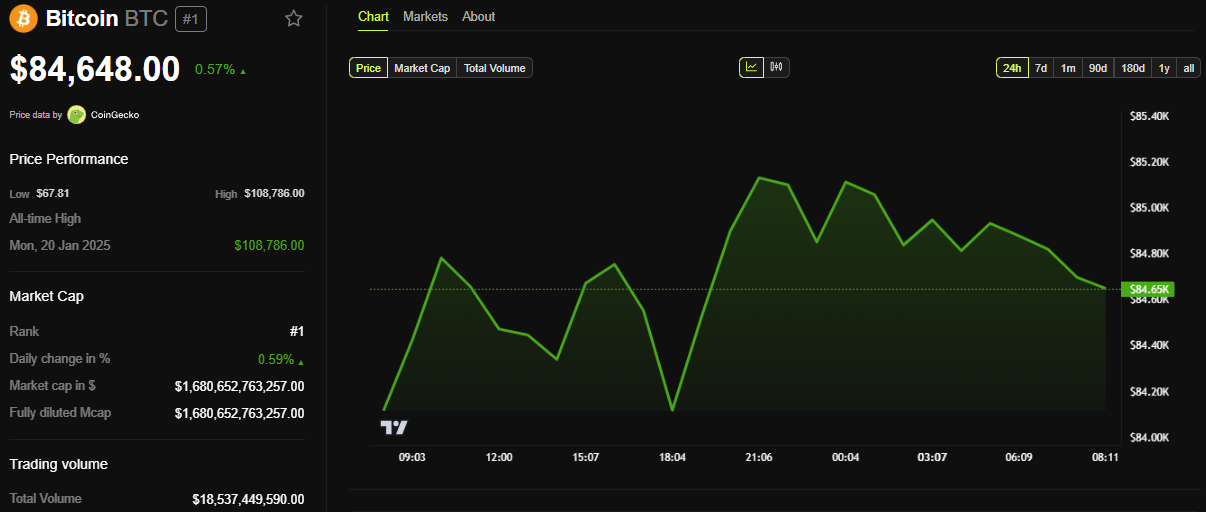Bitcoin
Florida CFO Advocates Strategic Bitcoin Reserve


Florida Chief Financial Officer (CFO) Jimmy Patronis has proposed the establishment of a “Strategic Bitcoin Reserve.” He formally recommended that Florida’s pension funds — covering firefighters, teachers, police officers, and other public sector workers—consider Bitcoin as a potential asset.
If the proposal passes, the move could set a new trend in state-backed financial strategies.
Bitcoin May Join Florida State Pension Funds
Patronis argues that Bitcoin, often referred to as “digital gold,” could serve as a powerful diversification tool. The CFO says it could help shield the state’s investments from the volatility typically seen in traditional asset classes.
“Bitcoin is often called “digital gold,” and it could help diversify the state’s portfolio and provide a secure hedge against the volatility of other major asset classes,” read an expert in his letter to Chris Spencer, Executive Director of the Florida State Board of Administration (SBA).
The letter formalizes the SBA’s request to analyze the viability of including Bitcoin and other digital assets in the state’s investment portfolio. This analysis would evaluate the potential risks, benefits, and overall feasibility. This is amid plans to add digital currencies to Florida’s pension funds through a “Digital Currency Investment Pilot Program.”
Patronis says the proposal aligns with Florida’s economic goals. He emphasized innovation and progressive financial strategies as core elements of the state’s investment philosophy. In his letter, Patronis also highlighted Florida’s impressive economic track record. He added that a diversified portfolio, including digital assets, could potentially bolster the state’s finances.
Read more: How To Buy Bitcoin (BTC) and Everything You Need To Know
This approach mirrors steps taken by other states, including Wisconsin and Michigan, where small allocations of pension funds were directed into Bitcoin-focused ETFs (exchange-traded funds). Such funds allow indirect exposure to Bitcoin, letting institutional investors gain from cryptocurrency growth without direct ownership.
Similarly, Arizona has begun legislative efforts to incorporate digital assets into state retirement funds three years after proposing to make Bitcoin legal tender. Notable moves by Wyoming and Nebraska also display a national momentum toward crypto adoption. They have both developed frameworks to attract crypto-friendly businesses and charter digital asset banks.
Patronis cited these examples to illustrate how digital currency investments are gaining mainstream traction, particularly within state financial structures. Another unmentioned example is Jersey City, which recently opted to invest in a Bitcoin ETF as a hedge for its city pension fund, aiming to mitigate broader financial risks.
These highlights reflect the broader trend of state and municipal bodies cautiously entering the crypto market. They want to capitalize on Bitcoin’s promise as a long-term, inflation-resistant asset.
A Potential Game-Changer for State Pension Funds
The potential inclusion of Bitcoin could help Florida’s pension funds achieve portfolio diversification. At the same time, it aligns with the State’s pro-innovation stance. Patronis pointed to the increased interest in Bitcoin as an inflation hedge and a store of value in both the US and international markets.
Recent developments include South Korea’s National Pension Service investment in MicroStrategy. This illustrates a shifting attitude among institutional investors worldwide. While Bitcoin remains volatile, many advocates argue that its finite supply and growing adoption make it a reliable long-term hedge.
Patronis stated that “a Digital Currency Investment Pilot Program” could initially be established within the Florida Growth Fund. This is a state initiative designed to accommodate more experimental, high-growth investments. If successful, the pilot program could signal a broader shift, allowing more government-backed funds to explore digital assets as viable financial tools.
Meanwhile, Patronis’s proposal comes as discussions around cryptocurrency and national investment policy heat up. Presidential aspirant Donald Trump recently proposed a national Bitcoin reserve. He aimed to establish a central crypto stockpile to enhance the United States’ financial independence.
“It will be the policy of my administration…to keep 100% of all the Bitcoin the US government currently holds or acquires into the future. This will serve in effect as the core of the strategic national bitcoin stockpile…I will be the pro-innovation and pro-Bitcoin candidate that America needs and that our citizens deserve,” Trump said.
This idea has added momentum to crypto advocates’ calls for government-backed digital asset investments. Trump’s proposal, if adopted, would serve as a major endorsement of Bitcoin’s role in institutional investment. It would also bolster its image as a strategic financial asset.
Patronis cited Trump’s stance to reinforce his call for state-level adoption. He suggested that the federal government’s exploration of a Bitcoin reserve could encourage states to incorporate digital assets. In the letter, Patronis also praised Florida’s Governor Ron DeSantis for his proactive measures in preventing central bank digital currencies (CBDCs) from affecting Floridian consumers and investors.
As BeInCrypto reported, DeSantis’s policy push focused on safeguarding citizens from federal control over financial data. He called CBDCs a threat to American liberty, which aligns with Patronis’s emphasis on financial autonomy.
Read more: Crypto Regulation: What Are the Benefits and Drawbacks?
Patronis’s endorsement of Bitcoin marks a noteworthy moment for public sector investment in digital assets. With global inflation concerns and potential economic slowdowns on the horizon, states like Florida are looking for ways to secure and diversify public funds.
It remains to be seen whether this proposal will materialize. For now, Patronis requests that the SBA prepare a detailed report on the risks and advantages of such a pilot initiative.
Disclaimer
In adherence to the Trust Project guidelines, BeInCrypto is committed to unbiased, transparent reporting. This news article aims to provide accurate, timely information. However, readers are advised to verify facts independently and consult with a professional before making any decisions based on this content. Please note that our Terms and Conditions, Privacy Policy, and Disclaimers have been updated.
Bitcoin
What Does This Mean for Altcoins?

Bitcoin’s (BTC) market dominance has surged to 64%, reaching its highest level in over four years.
However, experts remain divided on what this means for the future. Some predict an impending altcoin season, and others caution that Bitcoin’s dominance could continue to suppress altcoins.
What Does Bitcoin’s Rising Dominance Mean?
For context, Bitcoin dominance (BTC.D) refers to the percentage of the total cryptocurrency market capitalization that BTC holds. It is a key indicator of Bitcoin’s market strength relative to other cryptocurrencies. A rising dominance suggests that Bitcoin is outperforming altcoins, while a decrease may signal growing interest or investment in other digital assets.
The metric has been steadily increasing since late 2022. As of the latest data, it surged to 64%, marking highs last seen in early 2021.

Notably, Benjamin Cowen, founder of Into The Cryptoverse, highlighted that the number is much higher when excluding stablecoins.
“Excluding stable coins, Bitcoin dominance is now at 69%,” Cowen revealed.
The rise in Bitcoin dominance has sparked debate among analysts about its implications for altcoins. Cowen believes there will be a correction or downward movement in altcoins before any substantial gains can be expected in the market. This implies that the altcoin season may not be imminent yet.
“I think ALT/ BTC pairs need to go down before they can go up,” he stated.
Nordin, founder of Nour Group, also expressed caution. He stressed that Bitcoin dominance is nearing the levels seen during the peak of the 2020 bear market.
“This isn’t just a BTC move. Its capital rotating out of alts,” he noted.
Moreover, Nordin warned that a break above 66% could intensify selling pressure on altcoins. This, in turn, could delay the altcoin season.
“Bitcoin dominance back to 64%. No Alt seasons in 2024 or 2025,” analyst, Alessandro Ottaviani, predicted.
On the other hand, analyst Mister Crypto predicts that Bitcoin’s dominance may follow a long-term descending triangle pattern. A descending triangle typically suggests bearish momentum, where the price or dominance gradually decreases as lower highs are formed.
However, this could prolong its market control before a broader correction allows altcoins to gain traction.

Another analyst mentioned that Bitcoin dominance is currently testing the resistance zone between 64% and 64.3%. Therefore, a possible retracement may be on the horizon. Should this retracement occur, altcoins could begin to gain traction, with some potentially emerging as top performers in the market as capital shifts away from Bitcoin.
“However, a breakout from this zone could mean further declines for alts,” the analyst remarked.
Finally, Junaid Dar, CEO of Bitwardinvest, offered a more optimistic view. According to Dar’s analysis, if Bitcoin’s dominance drops below 63.45%, it could trigger a strong upward movement in altcoins. This, he believes, would create an ideal opportunity to profit from altcoin positions.
“For now, alts are stuck. Just a matter of time,” Dar added.
Tether Dominance Signals Potential Altcoin Season
Meanwhile, many analysts believe that the trends in Tether dominance (USDT.D) signal a potential altcoin season. From a technical analysis standpoint, USDT.D has reached a resistance zone and may be due for a correction, suggesting the possibility of capital flowing from USDT into altcoins.
“The USDTD is in a rejection zone, as long as it does not close above 6.75% it will be favorable for the market,” a technical analyst wrote.

Another analyst also stressed that the USDT.D and USD Coin dominance (USDC.D) have reached resistance, forecasting an incoming altcoin season. Doğu Tekinoğlu drew similar conclusions by observing the combined chart of BTC.D, USDT.D, and USDC.D.
As Bitcoin’s dominance climbs, investors are closely monitoring these technical and on-chain signals. The interplay between Bitcoin’s strength and stablecoin dynamics could dictate whether altcoins stage a comeback this summer or face further consolidation. For now, Bitcoin’s grip on the market remains firm.
Disclaimer
In adherence to the Trust Project guidelines, BeInCrypto is committed to unbiased, transparent reporting. This news article aims to provide accurate, timely information. However, readers are advised to verify facts independently and consult with a professional before making any decisions based on this content. Please note that our Terms and Conditions, Privacy Policy, and Disclaimers have been updated.
Bitcoin
Babylon’s TVL Drops 32% After Massive Bitcoin Unstaking

Babylon, a platform enabling native Bitcoin (BTC) staking, recorded a notable unstaking event on April 17. Approximately $1.26 billion worth of BTC was withdrawn from the protocol.
The move resulted in a significant decline in Babylon’s total value locked (TVL). Moreover, the price of its native token, BABY, also dipped.
Babylon’s TVL Drops 32% After Massive BTC Unstaking
Blockchain analytics firm Lookonchain alerted users about the unstaking on X (formerly Twitter).
“About 5 hours ago, 14,929 BTC($1.26 billion) was unstaked from Babylon,” the post read.

This move triggered a sharp drop in the platform’s TVL. According to data from DefiLama, Babylon’s TVL dropped from $3.9 billion to $2.6 billion in just a day, representing a decline of 32.7%. Moreover, only 31,502 BTC remain staked in the protocol at press time.
That’s not all. The BABY token was also not immune to market pressures. According to BeInCrypto data, the token depreciated by 9.8% over the past day alone. At the time of writing, the altcoin was trading at $0.8.

The unstaking led to widespread speculation about the platform’s stability and the broader implications for Bitcoin-based decentralized finance (DeFi) protocols.
“What’s going on. I don’t waste my time partaking in staking BTC, but this can be concerning. You don’t just see so much unstaking in such a short window,” a user said.
Nonetheless, Lombard Finance quickly moved to calm investor concerns. The Bitcoin restaking protocol, built on Babylon, clarified that the withdrawal was part of a planned transition to a new set of finality providers.
“To carry out the transition to our new set of Finality Providers, the Lombard Protocol has begun the process of unstaking BTC from the Lombard Finality Provider,” Lombard Finance stated.
The post emphasized that this process was a necessary step in the evolution of the platform. In addition, the company reassured investors that the withdrawn funds are expected to be restaked once the unbonding process concludes.
The unstaking event follows closely on the heels of Babylon’s airdrop earlier this month. 600 million BABY tokens—representing 6% of the token’s total supply—were distributed to early adopters, including Phase 1 stakers, Pioneer Pass NFT holders, and contributing developers.
Shortly after the airdrop, $21 million worth of Bitcoin was unstaked within 24 hours. This suggests a pattern of capital withdrawal that has intensified with the latest event.
Disclaimer
In adherence to the Trust Project guidelines, BeInCrypto is committed to unbiased, transparent reporting. This news article aims to provide accurate, timely information. However, readers are advised to verify facts independently and consult with a professional before making any decisions based on this content. Please note that our Terms and Conditions, Privacy Policy, and Disclaimers have been updated.
Bitcoin
What Good Friday Options Expiry Means for Bitcoin & Ethereum

On Good Friday, over $2.2 billion worth of Bitcoin and Ethereum options contracts expire today.
It comes as crypto markets continue to reel from macroeconomic uncertainty. President Donald Trump is pressuring the Federal Reserve (Fed) to cut interest rates, but the chair, Jerome Powell, will not budge.
Over $2.2 Billion Options Expire Today
Today, April 18, amid Good Friday celebrations, 23,221 Bitcoin (BTC) options contracts will expire. The notional value for this Friday’s tranche of expiring Bitcoin options contracts is $1.966 billion, according to data on Deribit.
The put/call ratio is 0.96, suggesting a prevalence of purchase options (calls) over sales options (puts).
As the Bitcoin options expire, they have a maximum pain or strike price of $82,000; at this point, the asset will cause the greatest number of holders’ financial losses.

Similarly, crypto markets will witness the expiry of 177,130 Ethereum contracts, with a notional value of $279.789 million. The put-to-call ratio for these expiring Ethereum options is 0.84, with a maximum pain of $1,600.
This week’s options expiry event is slightly smaller than what crypto markets witnessed last week on Friday. As BeInCrypto reported, approximately $2.5 billion worth of BTC and ETH options expired then, with short-term dips bringing put demand.

Traders and investors must closely monitor today’s developments as options expiry could lead to price volatility. Nevertheless, put-to-call ratios below 1 for Bitcoin and Ethereum in options trading indicate optimism in the market. It suggests that more traders are betting on price increases.
Meanwhile, analysts at Deribit highlight low volatility and flat skew. While this suggests a calm market, historical data from CoinGlass suggests post-expiry price swings are common, potentially signaling an upcoming move.
“With volatility crushed and skew flat, is the market setting up for a post-expiry move?” they posed.
Blackswan Event Likely, Greeks.live Analysts Say
Analysts at Greeks.live shed light on current market sentiment, echoing the calm outlook. However, they note that the market is predominantly bearish to neutral. Traders expect continued choppy action before potentially revisiting $80,000 to $82,000.
As of this writing, Bitcoin was trading for $84,648, slightly above its strike price of $82,000. Based on the Max Pain theory, prices will likely move toward this strike price as options near expiry.

Citing a mild sentiment, Greek.live analysts ascribe the calm to Trump not putting out a lot of news this week. Nevertheless, they anticipate more trade wars, heightened uncertainty, and volatility.
“We expect the trade and tariff wars to be far from over, and the uncertainty in the market will continue for a long time, as will the volatility in the market,” Greeks.live wrote.
They also ascribe the outlook to Powell’s comments, which created downward pressure as 100 bps rate cut expectations for the year were reduced. This led to crypto correlation with traditional markets.
Against this backdrop, Greeks.live says the probability of a black swan event is higher, where a rare, unexpected event that has a significant and often disruptive impact on the market occurs.
“…it is now a period of pain when the bulls have completely turned to bears, and investor sentiment is relatively low. In this worse market of bulls turning to bears, the probability of a black swan will be significantly higher,” they explained.
They urge traders to buy out-of-the-money (OTM) put options. An option is classified as out-of-the-money when its strike price is less favorable than the current market price of the underlying asset. This means it has no intrinsic value, only time value (the potential for it to become valuable before expiration).
Disclaimer
In adherence to the Trust Project guidelines, BeInCrypto is committed to unbiased, transparent reporting. This news article aims to provide accurate, timely information. However, readers are advised to verify facts independently and consult with a professional before making any decisions based on this content. Please note that our Terms and Conditions, Privacy Policy, and Disclaimers have been updated.
-

 Market23 hours ago
Market23 hours agoCrypto Casino Founder Charged With Fraud in New York
-

 Ethereum22 hours ago
Ethereum22 hours agoEthereum Whales Offload 143,000 ETH In One Week – More Selling Ahead?
-

 Market20 hours ago
Market20 hours agoCrypto Ignores ECB Rate Cuts, Highlighting EU’s Fading Influence
-

 Market19 hours ago
Market19 hours agoBinance Leads One-Third of the CEX Market in Q1 2025
-

 Altcoin18 hours ago
Altcoin18 hours agoDogecoin Price Breakout in view as Analyst Predicts $5.6 high
-

 Ethereum17 hours ago
Ethereum17 hours agoEthereum Investors Suffer More Losses Than Bitcoin Amid Ongoing Market Turmoil
-

 Altcoin17 hours ago
Altcoin17 hours agoTron Founder Justin Sun Reveals Plan To HODL Ethereum Despite Price Drop
-

 Market14 hours ago
Market14 hours agoEthereum Price Fights for Momentum—Traders Watch Key Resistance






















